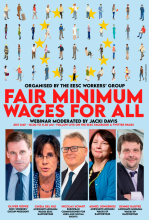The Employers' Group in the European Economic and Social Committee massively voted against the EESC opinion on the European Commission's proposal on "adequate minimum wages in the European Union" and tabled a counter-opinion, which will be appended to the EESC opinion as it has collected more than a third of the votes.
Γλώσσες
Κύριο μενού
Νέα από Εξωτερικό
Αρχική » Νέα από Εξωτερικό
Υπηρεσίες του Ο.ΜΕ.Δ.
Οι υπηρεσίες του Ο.ΜΕ.Δ. παρέχονται στις συνδικαλιστικές οργανώσεις εργοδοτών και εργαζομένων καθώς και σε μεμονωμένους εργοδότες σε επίπεδο επιχείρησης που επιθυμούν να απευθυνθούν σε αυτόν. Μεταξύ των εργοδοτών συγκαταλέγεται και το Ελληνικό Δημόσιο, για τους εργαζόμενους με σχέση εργασίας ιδιωτικού δικαίου στις Δημόσιες υπηρεσίες, Ν.Π.Δ.Δ. και Ο.Τ.Α.
Υπηρεσίες
Στοιχεία επικοινωνίας
Διεύθυνση: Πλατεία Βικτωρίας 7, 104 34 Αθήνα
Τ: +302108814922
E: e-mail: [email protected]
Ωράριο λειτουργίας: Δευτέρα – Παρασκευή, 09.00 – 17.00
Πνευματικά Δικαιώματα - Όροι χρήσης
Copyright © 2014 Οργανισμός Μεσολάβησης & Διαιτησίας All rights reserved.
Unless otherwise stated, the content of this page is licensed Under Creative Commons Attribution-NonCommercial-ShareAlike 3.0


